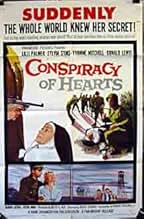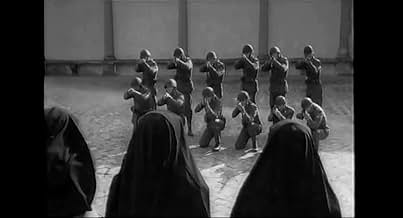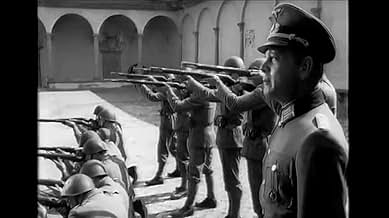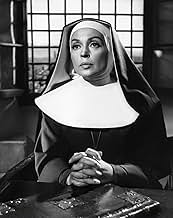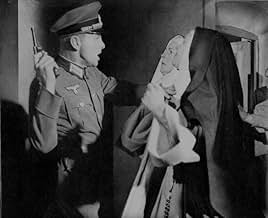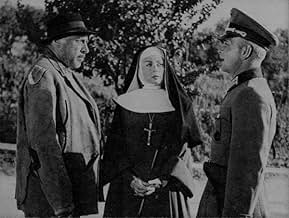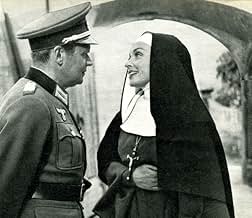अपनी भाषा में प्लॉट जोड़ेंCatholic nuns risk their lives to help Jewish children in an Italian internment camp escape to Palestine during World War II.Catholic nuns risk their lives to help Jewish children in an Italian internment camp escape to Palestine during World War II.Catholic nuns risk their lives to help Jewish children in an Italian internment camp escape to Palestine during World War II.
- निर्देशक
- लेखक
- स्टार
- पुरस्कार
- कुल 1 नामांकन
फ़ीचर्ड समीक्षाएं
Ralph Thomas and Betty Box belong so firmly to the tale of the British cinema's protracted postwar decline, and their output runs so much to cheerful mediocrity and worse, that it would be churlish not to salute this exception.
A film about a mixed European bag of nuns in sunny Italy, sheltering Jewish children from nasty German occupiers, could have easily wound up as sticky or preachy as a Hollywood movie of the week or after-school special "endorsed by the National Education Association". This production does quite a bit better.
To begin with, the couple took the commercially bold decision to shoot in dramatically suitable monochrome (Rank was very into Technicolor) despite the temptation of those gorgeous locations near Florence. Next, Rank's addiction to polyglot casts proves acceptable, since the nunnery and the Cahtholic church are multinational, as is the war situation: the convention of Colonel Albert Lieven talking in Teutonically accented English and others in Italianate English does not distract.
Thirdly, the cast is well chosen. Sylvia Syms, a rising English rose, was the novice. Michael Goodliffe was a familiar officer/vicar type, decent and tense as the nuns' protective priest. Lilli Palmer, that quintessentially cosmopolitan star, is apt (if a little too soigne) as Mother Superior. Ronald Lewis as the Italian major torn between allegiance to the Axis and revulsion at its persecutions, patronised by Lieven and a worm about to turn, is his customary sombre self. (Both Lewis and Goodliffe were suicides).
Fourthly, the mise-en-scene is ideal for moral conflicts: sunny exteriors and open hillsides against the shadowy cloister and catacombs where the hunt for hidden escapees from a concentration camp culminates. Thomas is no Bresson or da Sica, but he makes good use of his lighting cameraman, and in his workmanlike way keeps the tension boiling. The religious angle (with its dilemmas of obedience, confession and incompatible loyalties) is deftly threaded through the chase to raise the tone.
For a 'U'-certificated production there is an unholy amount of screen time leading up to, and about, killings and executions: it's about younger children but not for them.
As always, Box and Thomas are craftsmanlike, most to be praised for the mistakes and ineptitudes they avoid.
This is not "The Sound of Music" sans music. The storyline is not muffled by subplots, the enemy are not caricatured (Lieven convincingly depicts a non-Nazi career officer, forced into exemplary cruelty by his force's isolation amid partisans) and the slither into sentimentality is avoided nearly all the time. This is the price the script willingly pays for not characterising the children much; on the other hand, the issue of whether nuns gladly harboured Jews and made concessions to Judaism under a Christian roof is not shirked.
Adrian Scott, a member of the Hollywood Ten, outlined a plot based on real incidents which was worked up by Marsha Hunt's longtime husband, Robert Presnell Jr. It was unusual for the Pinewood team to work with Americans, who may have helped keep the film's political aspects uppermost-- and, as it were, salted it with some asperity, so that it plays pretty smartly and kitsch-free today.
Barney Balaban of Paramount saw its premiere while in London and paid Rank handsomely for the rights on impulse. The film fared well in an America not yet used to stories of Nazi anti-Jewish actions: the Auschwitz trial and Eichmann's capture would soon make them too familiar. In Britain, "Conspiracy of Hearts" was one of 1960's top grossers alongside Ralph's and Betty's latest "Doctor" film. Sadly, the latter would be much more typical of them thereafter.
A film about a mixed European bag of nuns in sunny Italy, sheltering Jewish children from nasty German occupiers, could have easily wound up as sticky or preachy as a Hollywood movie of the week or after-school special "endorsed by the National Education Association". This production does quite a bit better.
To begin with, the couple took the commercially bold decision to shoot in dramatically suitable monochrome (Rank was very into Technicolor) despite the temptation of those gorgeous locations near Florence. Next, Rank's addiction to polyglot casts proves acceptable, since the nunnery and the Cahtholic church are multinational, as is the war situation: the convention of Colonel Albert Lieven talking in Teutonically accented English and others in Italianate English does not distract.
Thirdly, the cast is well chosen. Sylvia Syms, a rising English rose, was the novice. Michael Goodliffe was a familiar officer/vicar type, decent and tense as the nuns' protective priest. Lilli Palmer, that quintessentially cosmopolitan star, is apt (if a little too soigne) as Mother Superior. Ronald Lewis as the Italian major torn between allegiance to the Axis and revulsion at its persecutions, patronised by Lieven and a worm about to turn, is his customary sombre self. (Both Lewis and Goodliffe were suicides).
Fourthly, the mise-en-scene is ideal for moral conflicts: sunny exteriors and open hillsides against the shadowy cloister and catacombs where the hunt for hidden escapees from a concentration camp culminates. Thomas is no Bresson or da Sica, but he makes good use of his lighting cameraman, and in his workmanlike way keeps the tension boiling. The religious angle (with its dilemmas of obedience, confession and incompatible loyalties) is deftly threaded through the chase to raise the tone.
For a 'U'-certificated production there is an unholy amount of screen time leading up to, and about, killings and executions: it's about younger children but not for them.
As always, Box and Thomas are craftsmanlike, most to be praised for the mistakes and ineptitudes they avoid.
This is not "The Sound of Music" sans music. The storyline is not muffled by subplots, the enemy are not caricatured (Lieven convincingly depicts a non-Nazi career officer, forced into exemplary cruelty by his force's isolation amid partisans) and the slither into sentimentality is avoided nearly all the time. This is the price the script willingly pays for not characterising the children much; on the other hand, the issue of whether nuns gladly harboured Jews and made concessions to Judaism under a Christian roof is not shirked.
Adrian Scott, a member of the Hollywood Ten, outlined a plot based on real incidents which was worked up by Marsha Hunt's longtime husband, Robert Presnell Jr. It was unusual for the Pinewood team to work with Americans, who may have helped keep the film's political aspects uppermost-- and, as it were, salted it with some asperity, so that it plays pretty smartly and kitsch-free today.
Barney Balaban of Paramount saw its premiere while in London and paid Rank handsomely for the rights on impulse. The film fared well in an America not yet used to stories of Nazi anti-Jewish actions: the Auschwitz trial and Eichmann's capture would soon make them too familiar. In Britain, "Conspiracy of Hearts" was one of 1960's top grossers alongside Ralph's and Betty's latest "Doctor" film. Sadly, the latter would be much more typical of them thereafter.
Towards the end of the second world war, an order of Italian nuns makes all attempts to secure the freedom of Jewish children held captive in a local concentration camp. However when the camp comes under the direct control of German troops, the Sisters' task becomes increasingly dangerous.
Combing elements of The Von Trapp Story and Black Narcissus, Conspiracy of Hearts is a surprisingly powerful depiction of the clash between faith and might, as Palmer's Mother Superior stands firm against Lieven's uncompromising Nazi Colonel. The question of conscience and commitment to duty is repeatedly explored, from the perspective of both nun and soldier - Mitchell's Sister Gerta fears and doubts the Holy Order's actions, Sims' novitiate Sister Mitya is forced to confront her feelings towards Lewis's Major Spoletti, who in turn must choose between military duty and moral salvation. The juxtaposition between Catholicism and Judaism is also fascinatingly explored as the Sisters struggle to comprehend the facets of a different faith.
Universally well-performed by the ensemble, as usual its the supporting performances that stand out - Yvonne Mitchell was a power-house actress and at the peak of her film career (shockingly she is all but forgotten now), and her transformation from angry doubter to selfless devotee is totally believable. In addition, Ralph Thomas coaxes extraordinary performances from his juvenile cast - Rebecca Dignam and Joseph Cuby are beautifully moving without being cutesy or maudlin (Hollywood child actors take note!). At the heart, Palmer creates a depiction of quiet strength, dignity and humour even if we could have coped with a little less lipstick and mascara!
Combing elements of The Von Trapp Story and Black Narcissus, Conspiracy of Hearts is a surprisingly powerful depiction of the clash between faith and might, as Palmer's Mother Superior stands firm against Lieven's uncompromising Nazi Colonel. The question of conscience and commitment to duty is repeatedly explored, from the perspective of both nun and soldier - Mitchell's Sister Gerta fears and doubts the Holy Order's actions, Sims' novitiate Sister Mitya is forced to confront her feelings towards Lewis's Major Spoletti, who in turn must choose between military duty and moral salvation. The juxtaposition between Catholicism and Judaism is also fascinatingly explored as the Sisters struggle to comprehend the facets of a different faith.
Universally well-performed by the ensemble, as usual its the supporting performances that stand out - Yvonne Mitchell was a power-house actress and at the peak of her film career (shockingly she is all but forgotten now), and her transformation from angry doubter to selfless devotee is totally believable. In addition, Ralph Thomas coaxes extraordinary performances from his juvenile cast - Rebecca Dignam and Joseph Cuby are beautifully moving without being cutesy or maudlin (Hollywood child actors take note!). At the heart, Palmer creates a depiction of quiet strength, dignity and humour even if we could have coped with a little less lipstick and mascara!
I first saw this movie in 1960 when I was 10 and was taken to see it with my mother on our weekly Monday night visit to the Cinema. I didn't go out of choice, It was just for me and my mother to get out of my Fathers way so he could get on with jobs about the house. I can't remember many films that I saw at that time but this was one of the few that stuck in my mind. I suppose it was that I could identify with the Children as they were about my age and that it was about the war. Those of us born in the 40's and 50's grew up with stories about the war. It was certainly a topic for discussion I'm our household as my Father had been a radio operator in the RAF from 1939 onwards.
I can remember being deeply moved and disturbed by it even at that young age especially at the climatic ending. Since then I have seen it on TV as it occasionally pops up on UK TV often in the afternoons. The last time it appeared about 18 months ago I took the opportunity to record it on Video. I watch it when I need to renew my faith in mankind as it proves that even in the darkest times, there are people who will risk all for others and their beliefs and that goodness eventually triumphs over evil.
I can remember being deeply moved and disturbed by it even at that young age especially at the climatic ending. Since then I have seen it on TV as it occasionally pops up on UK TV often in the afternoons. The last time it appeared about 18 months ago I took the opportunity to record it on Video. I watch it when I need to renew my faith in mankind as it proves that even in the darkest times, there are people who will risk all for others and their beliefs and that goodness eventually triumphs over evil.
Please can this beautiful film regarding Christian suffering and the understanding of standing for principles of truth be re-released on DVD. Even though I am not a Catholic Christian, but of another part of the family of Christ, I attended a Catholic school and I just feel this a really beautiful film.May God Bless all those Christians that risked their lives to save Jews and the weak in Nazi Occupied Europe. I feel these kind of films must be shown to an ignorant generation of people that have forgotten the horrors of World War 2. The wish of those that gave their lives in World War 2 for freedom and peace is that "We don't forget".Even if we look at the World now there is still genocide still taking place against vulnerable people just because they are different or speak different.
I first saw this film at the Mile End Odeon in East London when I was a kid. I was with a couple of friends and we thought that this film would be just another British war film. However, Mile End in those days still had a reasonably large Jewish population and older people all around us kids were openly weeping throughout the showing of the film. Later, in the foyer a woman told us that her family had been killed during the Hollocaust. A saw this film again quite recently on television and it really is quite a remarkable film. The characters have real depth and the the story about nuns sheltering Jewish children from the Nazis in Italy during World War II is not sentimentalised. The sub-plot concerning an unrequited love story between an Italian officer and a novice nun is is really well presented and does not intrude on the main story concerning Nazi ruthlessness and brutality towards the Jewish children and the nuns.
क्या आपको पता है
- ट्रिवियाIt was the 5th most popular film at the British box office in 1960.
- गूफ़Throughout the scenes in which they appear, most of the nuns are wearing make-up. This would be most unlikely for nuns.
- भाव
German Soldier: Mother of God: I've killed a nun!
- कनेक्शनFeatured in Film Profile: Betty Box and Ralph Thomas (1961)
टॉप पसंद
रेटिंग देने के लिए साइन-इन करें और वैयक्तिकृत सुझावों के लिए वॉचलिस्ट करें
विवरण
- रिलीज़ की तारीख़
- कंट्री ऑफ़ ओरिजिन
- भाषा
- इस रूप में भी जाना जाता है
- Verschwörung der Herzen
- फ़िल्माने की जगहें
- Certosa di Firenze, Galluzzo, Firenze, Toscana, इटली(Convent exteriors)
- उत्पादन कंपनी
- IMDbPro पर और कंपनी क्रेडिट देखें
- चलने की अवधि1 घंटा 53 मिनट
- रंग
- ध्वनि मिश्रण
- पक्ष अनुपात
- 1.85 : 1
इस पेज में योगदान दें
किसी बदलाव का सुझाव दें या अनुपलब्ध कॉन्टेंट जोड़ें


